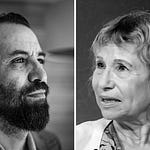Romi, Emily, and Doron Are Home
Our Zoom call this week, for paid subscribers, will be on Friday, January 24, at 1 PM Eastern, our regular time.
Our guest will be Jamaal Bowman, who lost his seat in Congress last year after his support for Palestinian rights prompted a ferocious attack by AIPAC and other pro-Israel organizations.
I’ve met many politicians. Very few risk their careers on questions of moral principle. I want to ask Jamaal why he did, and what it would take to convince other Democrats to do the same.
I’ve also recorded another Zoom video, without a live audience, with my friend, the brilliant Gaza-born political analyst Muhammad Shehada. He explained why this agreement shows that Israel never really had a strategy against Hamas. He argued that the ceasefire just might endure. And when he described conditions in Gaza, I put my head in my hands. As much as I try to understand the horror there, I’m reminded again and again that its worse than I even imagine. We will send out my conversation with Muhammad to paid subscribers on Wednesday.
Ask Me Anything
Our next “Ask Me Anything,” for premium subscribers, will be on Monday, January 27, at 1 PM Eastern. I’ll answer questions about the ceasefire, the Trump administration, and anything else on your mind. We’ll do another “Ask Me Anything,” in February, about my new book.
Book Tour
Knopf will publish my new book, Being Jewish After the Destruction of Gaza, on January 28, in just over a week. I’ll be honored if readers buy it. But I hope you’ll also consider buying a book by a Palestinian author given that Palestinian writers still get much less exposure in the US media. (Here are some suggestions). And that you’ll also consider donating to a charity that works in Gaza.
In the coming weeks, I’ll be doing many book-related events. We’ll be adding them as they go online. Here’s what we have so far:
On Wednesday, January 29, I’ll be speaking with MSNBC’s Ayman Mohyeldin at the New York Society for Ethical Culture. The event is being sponsored by Jewish Currents and the registration link is here. Paid subscribers can view a code at the very bottom of this page (after video transcript) to receive a free ticket or a discounted price on the ticket plus the book.
On Tuesday, February 18, I’ll be speaking with UCLA historian David Myers at the Lumiere Music Hall in Los Angeles.
On Monday, February 24, I’ll be speaking with Washington Post columnist Karen Attiah at Politics and Prose bookstore in Washington, DC.
On Monday, March 3, I’ll be speaking with Professor Atalia Omer at Notre Dame University.
On Tuesday, March 18, I’ll be debating an old classmate, Michael Rubin of the American Enterprise Institute, on the proposition “The oppression of Palestinians in non-democratic Israel has been systematic and profound” at the Soho Forum in New York.
Sources Cited in this Week’s Video
Rabbi Abraham Joshua Heschel’s book, The Prophets.
Things to Read
(Maybe this should be obvious, but I link to articles and videos I find provocative and significant, not necessarily ones I entirely agree with.)
In Jewish Currents (subscribe!), Ussama Makdisi revisits Edward Said to understand Israel’s destruction of Gaza.
Dave Chappelle talks about Gaza.
Tamer Nafar asks where God was during Gaza’s destruction.
A new poll suggests that anger over Gaza may have dissuaded people from voting in 2024.
The farewell tour continues. Antony Blinken speaks to David Remnick and Jake Sullivan speaks to Ezra Klein.
See you on Friday, January 24 and Monday, January 27,
Peter
VIDEO TRANSCRIPT:
So, there’s a lot to say about the ceasefire agreement between Israel and Hamas, whether it will continue, whether Israel has achieved the goals of this catastrophic war, all of these things. But I don’t think that’s the conversation for today. At least it’s not where my heart is. I’m just thinking about the three Israeli hostages that have been released: Romi and Emily and Doron.
And I want to suggest that I think that for this particular day, for those of us who are Jews, that that’s okay. It’s okay to have one day where we put aside our very, very harsh criticisms of the Israeli government, and of the horrifying things that it does. And even, we put aside for a moment our anger and fury about the destruction of Gaza. And we just participate in the relief and solidarity and joy of the Jewish people as we see three people being relieved from captivity, knowing that the release of hostages is among the most sacred principle in Judaism, and is meant to unite Jews across whatever divides we face.
I think that if the danger of the mainstream public discourse about Israel is that it loses sight of the humanity of Palestinians, which happens again and again and again, there is another danger that can exist on the Left that people on the Left lose sight of the humanity of Israelis. And this is a moment to make sure that that does not happen.
It’s also, I think, important to remember that if in the mainstream kind of establishment Jewish discourse, that a sense of love and solidarity for the Jewish people can often blind Jewish leaders and Jewish organizations to the necessity of judgment, the necessity of moral judgment for the things that Israel does, there is the danger that Jewish critics on the Left can have the reverse problem. Which is to say that the constant focus on judgment, on moral judgment—as crucial as it is, it’s never been more crucial than in these horrifying last 15 months—that that can blind us to the necessity of solidarity and love. And that it’s important to remember that we can have these different feelings, but we don’t have to have them in the same proportions every day.
It famously says in Ecclesiastes that ‘a season is set for everything, a time for every experience under heaven.’ So, this can be a time, a day, to just delight in the release of these three young women. And there can be another day, another season. There will have to be tragically again and again and again to return to our anguish and our fury about what Israel has done in Gaza.
As I was thinking about this, I was thinking a little bit about re-reading a little part of Abraham Joshua Heschel’s famous legendary book about the prophets. Of course, neither I nor I think anyone who’s listening to this is a prophet. But there are lessons to be taken from the lives of the prophets. And the point that Heschel makes is that the prophets were trying to imitate what he called ‘God’s divine pathos,’ which is to say the emotions that God felt towards humanity, but also, according to Torah and the Hebrew Bible, God’s feelings, special feelings towards the Jewish people, towards the people of Israel. And so, the prophets then are trying to emulate in a way this combination of God’s anger, righteous anger, which very, very present, but also God’s love.
And I think one of the points that Heschel makes is that the prophets were furious, furious, brutal critics of the Jewish people. Ferocious, ferocious critics. And yet, they tried not to forget that although anger was one attribute of God’s relationship with humanity, and indeed particularly God’s relationship with the Jewish people, it was not the paramount emotion. The paramount emotion was love, and that therefore the profits should also try to have—even amidst their moral fury at the corruption, the barbarism, the degradation that they were seeing around them—they should always try to remember that the supreme element of God’s pathos is actually, the more enduring one, is love.
And Heschel writes, ‘as a mode of pathos, it may be accurate to characterize the anger of the Lord as suspended love, as mercy withheld, as mercy in concealment. Anger prompted by love is an interlude. It is as if compassion were waiting to resume.’ So, the point he’s making is that even when God is most angry, that it is always temporary, and there was always the love underneath it. And this is what the prophets were striving to emulate. And this is what we, perhaps as critics of Israel, even though we’re far from prophets, should also try to emulate: the notion that underneath the fury and anger and profound disappointment must always be this love that can return whenever there is a moment of opportunity for it to return.
Heschel goes on: ‘the pathos of anger is further a transient state. What is often proclaimed about love’—and then he quotes from the book of Jeremiah—‘for the Lord is good for his steadfast love endures forever is not said about anger. The normal and original pathos is love or mercy, not anger.’ And I think that, just as it was a model for the prophets, should be a model for all of us. That despite what has happened over the last 15 months, that I think is increasingly being recognized as a genocide, really just about the worst thing that we could imagine a state ever doing. And even though that calls us to resist, to oppose, to fight against this profound, profound form of injustice again and again and again, that the love and solidarity that we have—not just for all human beings, but that we are allowed to have as Jews for our own people, for the Jewish people, imagined throughout Jewish text as an extended family—that that should never be lost.
And whenever there is a moment for it to return, for it to come back to the surface, even if it’s only temporary, for us to join with other Jews in sense of solidarity and grief and, indeed, in joy when there is a moment of suspension of the fighting, and a moment of seeing Jews come back from the hell of captivity in Gaza, to see them come back alive. It seems to me that’s what we’re called to do in this moment: just to put aside for a moment the anger, the condemnation, the fury, the pain, and to share in that love.
Surely, if the prophets could do that—given their acute sense of human injustice in the world that those of us who are so much lesser than them—that we can try to do that as well. And we can take just this moment to delight, along with other Jews, in the fact that Romi and Doron and Emily, and hopefully many, many, many more other hostages, will come back safe to be with their family—indeed to be with our family, the family of the Jewish people.
For Beinart Notebook paid subscribers, register here, and you can use the code “NOTEBOOK2025” to receive a free ticket or a discounted price on the ticket plus the book.











Share this post